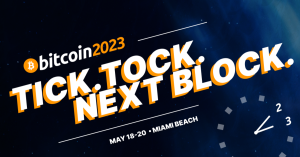Bitcoin 2023: Unlimit’s Jack Jia discusses fiat on/off ramps for crypto business
Unlimit’s expansion into the crypto space aims to bridge the gap between traditional banking networks and the rapidly evolving crypto world, facilitating seamless conversions into various digital wallets and enhancing scalability through off-chain solutions.

Thousands of Bitcoin enthusiasts flocked to Miami Beach for the third consecutive year to attend the Bitcoin 2023 conference, the premier event dedicated to exploring and celebrating the world of cryptocurrencies and blockchain technology.
The conference boasted a lineup of notable speakers, including U.S. presidential candidate Robert F. Kennedy and author Michael Lewis. Considered the “world’s largest Bitcoiners’ gathering,” the event spanned from May 18 to May 20, culminating in an exclusive afterparty.
In this vibrant setting, we have the unique opportunity to delve deep into the minds of trailblazers, entrepreneurs, and thought leaders in the crypto space. Through engaging interviews, we uncovered their insights, perspectives, and experiences, shedding light on the latest trends, developments, and challenges within this rapidly evolving industry.
Today, we are thrilled to have the exclusive opportunity to conduct an in-depth interview with Jack Jia, the esteemed Head of Unlimit Crypto at global fintech Unlimit.
From London to Singapore and from San Francisco to São Paulo, the company continues to make waves in the industry. Thus, exploring Mr. Jia’s perspectives, experiences, and vision promises to be a captivating and enlightening endeavor.
Unlimit, initially established in 2009 as a payment processing and banking-as-a-service provider, has now ventured into the realm of cryptocurrencies. The significance of fiat on and off ramps was a focal point of the discussion.
Jack Jia explained that fiat on and off ramps serve as crucial tools for users seeking to transfer money and value between web-based platforms, bank accounts, and other storage facilities. Unlimit recognized the necessity of bridging the gap between traditional banking networks and the rapidly evolving crypto world, thereby facilitating seamless conversions into various digital wallets, including Bitcoin, Ethereum, and multi-chain wallets.
Jack also highlighted the exciting developments occurring within the Bitcoin ecosystem, such as sovereign and roll-ups, ERC-20 tokens, and the Lightning Network. He explained how Unlimit’s expansion into the crypto space aligns with the convergence of private payment networks and public blockchain networks. By incorporating off-chain solutions, Unlimit aims to enhance scalability and foster interoperability.
Meanwhile, the integration of Unlimit Crypto marks a natural progression for Unlimit, leveraging its expertise in payments and banking to provide a comprehensive suite of services in the crypto sphere. Offering both on and off ramps, stablecoin interoperability, and innovative solutions for asset management, Unlimit bridges the gap between traditional finance and the emerging world of cryptocurrencies.
During the interview, Jack Jia provided insights into the functionality of Unlimit’s Software Development Kit (SDK) and its various use cases. The company offers separate SDKs for its payment, banking, and crypto divisions, each serving distinct purposes.
In the realm of payments, the SDK enables seamless payment capture from end users, allowing businesses to integrate secure and customizable payment flows into their platforms. By utilizing embedded widgets or white-label APIs, merchants can effortlessly facilitate transactions, akin to popular subscription-based services like Netflix or Disney.
In the case of fiat transactions, users make payments using traditional currency, and the merchant receives the funds, subsequently releasing the purchased item, whether it’s a t-shirt or a cup of coffee.
Unlimit’s banking division also incorporates an SDK that facilitates the creation of master accounts and sub-accounts. This banking service empowers neobanks and fintech applications to establish user-friendly interfaces by leveraging the API provided by sponsor banks. Additionally, the SDK supports crucial functionalities such as user onboarding, including the necessary Know Your Customer (KYC) and Anti-Money Laundering (AML) processes.
The head of Unlimit Crypto further notes that the interoperability between web-based banking accounts and crypto wallets becomes feasible through Unlimit’s banking-as-a-service API SDK. This integration enables seamless conversions, staking, and payment functionalities between Web 2.0 bank accounts and Web 3.0 crypto wallets. By bridging the gap between traditional finance and the crypto ecosystem, Unlimit aims to enhance the user experience and promote wider adoption of digital currencies.
Moving on to the crypto side, Unlimit has developed a user-friendly SDK tailored specifically for wallets and decentralized applications (dApps). The SDK facilitates the onboarding process for various types of wallets and dApps across different blockchain ecosystems, including Bitcoin, Ethereum, and Solana. By providing a simple yet effective integration solution, Unlimit supports the growth of diverse applications in the crypto space, ranging from gaming to NFT marketplaces.
In the discussion on regulations and compliance, Jack emphasized the importance of understanding the legal frameworks that govern the industry.
While crypto space operates on digital jurisdiction and consensus mechanisms, it is essential to respect the physical jurisdiction and regulations imposed by different authorities. Unlimit acknowledges the necessity of complying with laws and regulations in each country, highlighting the positive impact that reasonable regulation can have on the industry. Additionally, Jack highlighted the importance of engaging in constructive dialogue with legislators to ensure that regulations are fair and conducive to the industry’s growth.
Moving on, Jack revealed new details about Unlimit Crypto, the company’s crypto division, which is currently in a private beta phase. They have already integrated with approximately 15 partners who are live and actively using the platform. Additionally, they have around 150 partners in the pipeline, indicating a strong interest in integrating with Unlimit Crypto.
Unlimit, with its 15 years of experience in building robust payment infrastructure, is already showing promising results in integrating the crypto stack into their existing framework.
Jack claims that Unlimit is the first regulated web-to-enterprise company entering the crypto space, highlighting the significance of their entry into this domain. They acknowledge the challenges and differences in accounting and transaction policies between traditional finance and crypto operations, emphasizing the need for education, institutional knowledge dissemination, and process adaptation.
Looking further ahead into the future, he noted that Unlimit is actively engaging with partners to gather feedback and improve their on-chain infrastructure. They are focusing on building key management layers, RPC (Remote Procedure Call) layers, and other microservices to provide a durable and reliable service to the crypto industry.
Overall, this stage of development involves continuous learning, collaboration with partners, and the establishment of a solid foundation to support custody and facilitate interactions with various blockchain networks.
FinanceFeeds also discussed Unlimit’s rapid expansion in various regions, including Latin America, the Middle East, Africa, and Nigeria.
Jack points out that the world is undergoing significant changes, transitioning into a multipolar world where different currencies and cryptocurrencies play a crucial role. Crypto regulations vary across countries, with some embracing comprehensive regulations like the EU’s Markets in Crypto Assets (MiCA) framework, while others have limited or no regulations in place.
According to Jack, Unlimit’s strategic focus on markets like Latin America, the Middle East, Africa, and Nigeria makes sense. These regions hold immense growth potential, surpassing that of traditional Western markets. By expanding their payment services in these areas, Unlimit aims to cater to local businesses engaged in international transactions, providing them with reliable payment solutions and enabling smoother cross-border commerce.
Despite their potential for growth, these regions face challenges in terms of their financial infrastructure and capital restrictions, he notes. Operating in these regions can be difficult due to less developed financial systems and potentially weaker government enforcement.
To address these challenges, Jack highlights the importance of establishing direct access on the ground and working closely with local payment networks and regulators. By building relationships with banks and central banks, they aim to integrate into the local infrastructure and overcome operational obstacles. He mentions that there are different approaches to entering a country and conducting business. One approach is to collaborate with resellers and aggregators who can assist in entering the market without the need for holding licenses directly. These local payment partners can provide valuable support.
In most cases, Unlimit prefers to obtain its own licenses in various regions to maintain control and ensure compliance. This is exemplified by their acquisition of a payments division license in Nigeria. However, he acknowledges that certain countries pose significant challenges, making it more practical to work with a local partner rather than pursuing licenses independently.
Within the same context, we asked Jack if they are planning to tap into any newer geographies now? Or are they sticking to the ones they are already in?
The head of Unlimit Crypto said their goal is to facilitate unlimited international expansion for merchants around the world. As such, they provide access to payment rails in any and every job. As for tapping into newer geographies, they are constantly evaluating opportunities for expansion. While they may focus on specific regions for a period of time, their overall objective is to enable global access to payment services.
The significant increase in Bitcoin transactions on April 30 raises the question of what this means for Bitcoin as a whole.
Reflecting on this, Jack said that from a Bitcoin Maximalist perspective, the recent surge in transactions may be seen as an existential threat and an attack on the Bitcoin network. However, from a broader ecosystem standpoint, this event has generated excitement about building on Bitcoin, which hasn’t been seen in a long time.
In his opinion, projects like RSK, Stacks, Lightning Network, and Omni have gained traction and are being used for various purposes such as building decentralized finance (DeFi) applications or issuing sovereign credit. This renewed enthusiasm for building on Bitcoin is a positive development because it indicates that builders and developers are actively working on innovative solutions that will shape the future of the ecosystem. These solutions, which may involve technologies like sovereign roll-ups, ERC-20 tokens, Lightning Network, and more, are pushing transactions to Layer 2 solutions, where smaller transactions can be processed efficiently and privately. This opens up new possibilities and enables regulated financial institutions to establish private channels for compliant payments.
Overall, the increased activity and technology advancements in the Bitcoin ecosystem are encouraging, and they pave the way for further dissemination and adoption of innovative solutions in the future.
So, looking ahead to the rest of the year, we asked what can companies, users, and investors expect in general? And specifically, what can we expect for Bitcoin based on Jack’s experience and perspective?
Jack provided an interesting answer. He said that we are currently in a bear market, so it’s important not to fall for any bull traps. It’s unlikely that we will see Bitcoin reach a million dollars per coin anytime soon, although that may be the trajectory we’re on. Many people have expectations based on previous market cycles, such as those in 2013, 2017, and 2021, where there were significant price increases. Some anticipate the next bull run to potentially start around Q4 2024, six months before or after the halving event. Until then, Jack advises to hold on tight and not get swayed by short-term market movements.
Dollar-cost averaging is a strategy worth considering, he notes, where you invest a fixed amount regularly regardless of market fluctuations. Paying too much attention to daily market prices can be distracting, given the various manipulations and regulatory uncertainties happening within the industry. For example, there have been coordinated efforts against cryptocurrencies by regulators, causing teams to relocate from the US to other regions that are more favorable for crypto development.
Despite price actions, the focus should be on building and contributing to the space. Whether it’s through initiatives like the Bitcoin Energy and Industrial Alliance or social media applications with gamification and cultural aspects, everyone should continue working on their projects and infrastructure. The goal is to build a social layer of consensus and provision for self-sovereignty, enabling an integrative experience between the traditional web and Web 3.0, where individuals can hold their own keys and have control over their data.
In summary, Jack advises to hold on, keep building, and focus on the long-term vision of the space, as there are multiple directions it can head towards.










